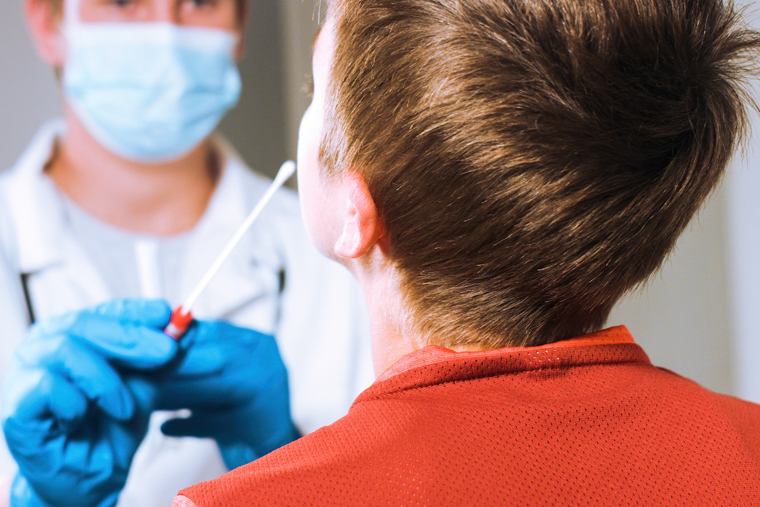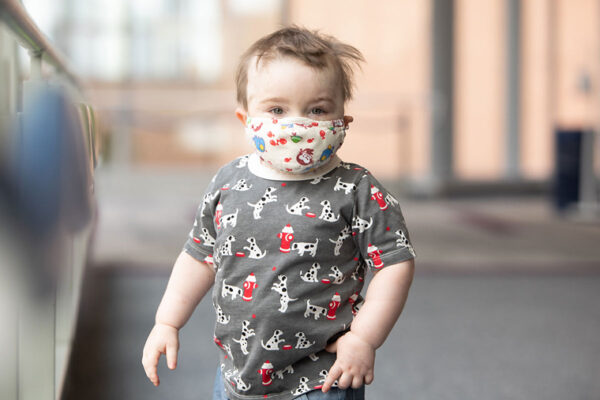An international study involving researchers at Washington University School of Medicine in St. Louis found that children up to age 18 with COVID-19 were at low risk for serious health problems stemming from such infections. The study was based on pediatric data analyzed up to June 2021, before the delta and omicron variants took hold.
The observational study followed more than 10,300 children — 3,200 of whom tested positive for COVID-19 — at 41 emergency departments in 10 countries including the United States, Canada, Australia, Argentina, Italy and Spain. About 23%, or 735 children, were hospitalized, while 3%, or 107 children total, suffered severe outcomes such as cardiac complications and neurological issues. Four children died.
Researchers also found that children deemed healthy at an initial emergency department visit rarely deteriorated significantly after the first visit.
The findings — published in JAMA Network Open — included data from March 2020 to June 2021, before the delta and omicron variants’ rapid spread across the world.
“We know that omicron is causing far more children to become ill with COVID-19 than at any other time in the pandemic and, because of this increase in infections, hospitalizations for kids who are sick from COVID-19 have spiked,” said one of the study’s authors, Fahd A. Ahmad, MD, associate professor of pediatrics in the Division of Pediatric Emergency Medicine at Washington University. “But the early data provide a clearer picture of COVID-19’s impact on children. Fortunately, even with omicron, most children are well enough to be taken care of at home.
“Overall, children do seem less likely to need ICU care due to COVID than adults” added Ahmad, who treats patients at St. Louis Children’s Hospital. “However, many children can become sick enough to need hospitalization. Those well enough to be at home are still contagious, and we don’t yet know the long-term effects of COVID-19 infections on kids. This is why it is so important for eligible children to get vaccinated and boosted.”
Similar to previous COVID-19 studies focused on children, the researchers found that the children most at risk for severe outcomes were preteens and teens, as well as those with pre-existing chronic conditions, such as diabetes and cancer. Children who sought physician care earlier during the course of their infections also were at a reduced risk of severe outcomes.
“While those with chronic medical conditions are at the highest risk for complications from COVID-19, children who are otherwise healthy can still become seriously ill due to COVID,” Ahmad said.
The study was co-led by a team of researchers from the University of Calgary’s Cumming School of Medicine in Canada, the Ann & Robert H. Lurie Children’s Hospital of Chicago, and the University of California, Davis.
“The study sought to quantify the frequency of and risk factors for severe outcomes in children with COVID-19,” said one of the study’s co-senior authors, Stephen Freedman, MD, a pediatrician and professor at the University of Calgary. “We found that older age, having a pre-existing chronic condition and symptom duration were important risk factors for severe outcomes.”
The study was part of the Pediatric Emergency Research Network, a consortium of major pediatric emergency medicine research networks.
Funk AL, Florin TA, Kuppermann N, Tancredi DJ, Xie J, Kim K, Neuman MI, Ambroggio L, Plint AC, Mintegi S, Klassen TP, Salvadori MI, Malley R, Payne DC, Simon NJ, Yock-Corrales A, Nebhrajani JR, Chaudhari PP, Breslin KA, Finkelstein Y, MD, Campos C, Bergmann KR, Bhatt M, Ahmad FA, Gardiner MA, Avva UR, Shah NP, Sartori LF, Sabhaney VJ, Caperell K, Navanandan N, Borland ML, Morris CR, Gangoiti I, Pavlicich V, Kannikeswaran N, Lunoe MM, Rino PB, Kam AJ, Cherry JC, Rogers AJ, Chong SL, Palumbo L, Angelats CM, Morrison AK, Kwok MY, Becker SM, Dixon AC, Poonai N, Eckerle M, Wassem M, Dalziel SR, Freedman SB on behalf of the Pediatric Emergency Research Network-COVID-19 Study Team. Outcomes of SARS-CoV-2 Infected Youths Tested in Emergency Departments: The Global PERN-COVID-19 Study. JAMA Network Open. Published Jan. 11, 2022.
This research was funded by the Canadian Institutes of Health Research; the Alberta Health Service; University of Calgary Clinical Research Fund, the Alberta Children’s Hospital Research Institute; the COVID-19 Research Accelerator Funding Track Program at the University of California, Davis; the Cincinnati Children’s Hospital Medical Center Division of Emergency Medicine Small Grants Program; the University of Calgary Eyes-High Post-Doctoral Research Fund; and the Alberta Children’s Hospital Foundation Professorship in Child Health and Wellness.
Washington University School of Medicine’s 1,700 faculty physicians also are the medical staff of Barnes-Jewish and St. Louis Children’s hospitals. The School of Medicine is a leader in medical research, teaching and patient care, and is among the top recipients of research funding from the National Institutes of Health (NIH). Through its affiliations with Barnes-Jewish and St. Louis Children’s hospitals, the School of Medicine is linked to BJC HealthCare.



